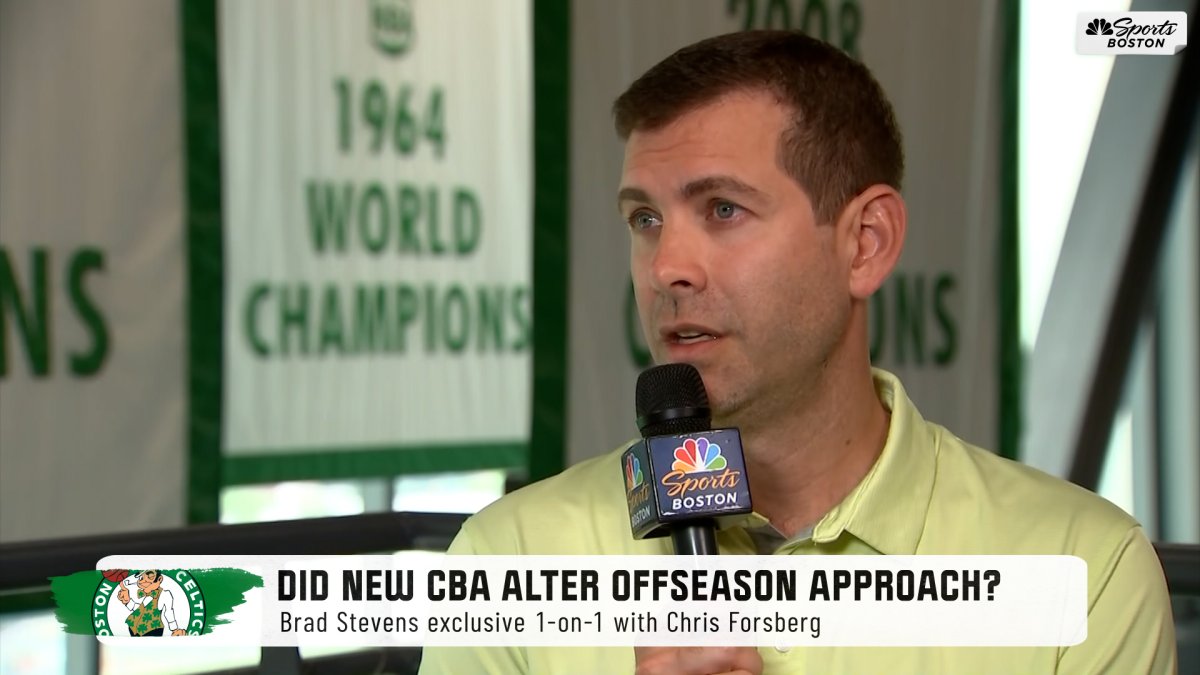
Brad Stevens speaks exclusively with Chris Forsberg about how the NBA’s new CBA impacted the Celtics offseason approach
The NBA's new collective bargaining agreement (CBA) begins July 1, but some aspects of the deal won't take effect until after the upcoming season.
The new CBA will make it tougher for contending teams to spend large amounts of money on star-studded rosters. Going deep into the luxury tax and over the "second apron" will cause teams to lose certain aspects of roster building, such as the mid-level exception, signing bought out players, among other things (read more about the second apron here).
We've already seen some of the effects of the new CBA in the last few weeks. A bunch of large contracts have been traded as teams prepare themselves for the realities of this CBA and how difficult it will be to surround multiple superstars with a ton of depth.
Stay in the game with the latest updates on your beloved Boston sports teams! Sign up here for our All Access Daily newsletter.
Celtics Talk: Brad Stevens details excruciating Marcus Smart trade, and more in exclusive sit down | Listen & Subscribe | Watch on YouTube
The Boston Celtics, as a contending team that often runs a high payroll, are certainly not immune from the harsh aspects of the new CBA. How has it impacted the team's roster-building plans this offseason?
"I mean, it definitely is factoring into every decision that we make," C's president of basketball operations Brad Stevens told NBC Sports Boston's Chris Forsberg in an exclusive interview Friday. "This is not watch film and all sit in a room and figure out what you want to do. This is put your version of Excel spreadsheets on the four screens in the room and figure out what you want to do and how you can manage it all the way through an extended period of time.
"And obviously, what you do now you can change over time. But you also have to just be cognizant of once you get to that second apron, right, there are going to be tools that are taken away, especially in future years. We're really lucky to work in a place where ownership is willing to spend and to do what it takes. And we're doing it again. But at the end of the day, we also have to be cognizant of not taking away too many tools now as a result of the new CBA."
One of the challenges for teams is balancing winning now, while not hampering your ability to win in future years at the same time. It could be a difficult line to walk for some franchises.
"I think that's a real thing. It's a balance and it's new," Stevens said. "There are things that are going to be affected because of it in every team across the league. There is a transition period with the new CBA that we have here before the second apron penalties become even harsher over the next couple of years."
CHRIS FORSBERG'S CBA SERIES
Based on the fact that several of the second apron penalties don't kick in until the 2024-25 campaign, is there even more of a priority on winning next season?
"Well, I think you just have to see where you're at as a team," Stevens explained. "All 30 teams are a little bit different. But our priority is to continue to chase a title. And we think that this gives us a chance to do that. But it's not without its risks, obviously, with, again, going back to this trade, (Kristaps) Porzingis is a really, really good player and we're losing a really, really good player."
Check out Forsberg's full interview with Forsberg in the video below.